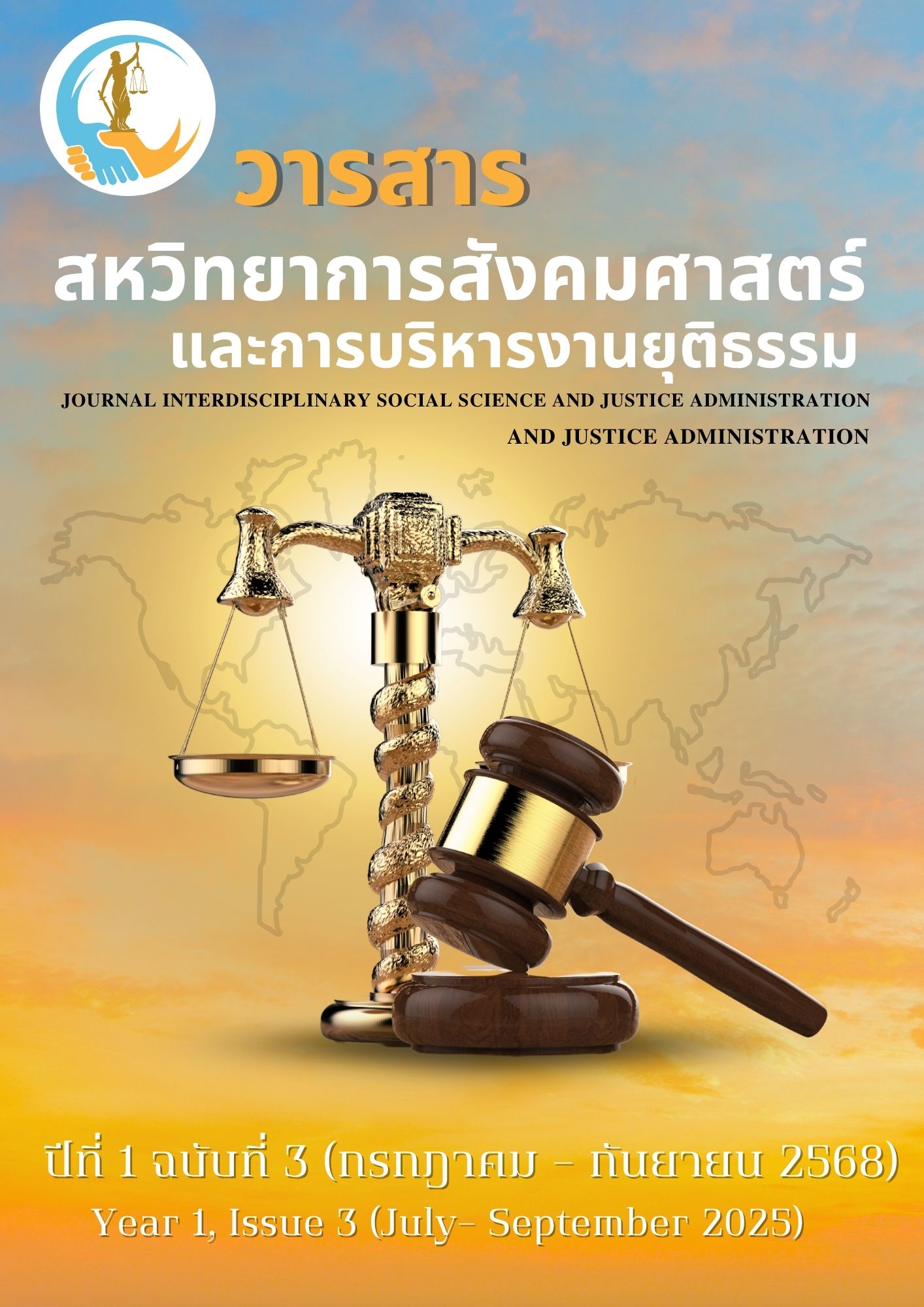การฟอกเงินโดยผ่านสกุลเงินดิจิทัล : แนวคิดทฤษฎี
Main Article Content
บทคัดย่อ
การฟอกเงิน เป็นปัญหาสำคัญที่ส่งผลกระทบต่อระบบเศรษฐกิจและความมั่นคงทางการเงินของนานาประเทศ โดยเฉพาะอย่างยิ่งในยุคดิจิทัลที่เทคโนโลยีทางการเงินได้พัฒนาไปอย่างก้าวกระโดด การเกิดขึ้นของสกุลเงินดิจิทัล (Cryptocurrency) และระบบบล็อกเชน (Blockchain) ได้สร้างทั้งโอกาสและความท้าทาย กล่าวคือ ในด้านหนึ่งเทคโนโลยีดังกล่าวช่วยส่งเสริมความสะดวก รวดเร็ว และลดต้นทุนในการทำธุรกรรม แต่อีกด้านหนึ่งกลับเปิดช่องให้เกิดการฟอกเงินในรูปแบบใหม่ที่ซับซ้อน และยากต่อติดตามและการตรวจสอบ
บทความนี้ จึงมุ่งศึกษารูปแบบการฟอกเงินโดยผ่านสกุลดิจิทัล โดยวิเคราะห์การฟอกเงินโดยผ่านสกุลเงินดิจิทัลผ่านแนวคิดและทฤษฎีที่มีความเกี่ยวข้อง อาทิ ทฤษฎีการสมคบ (Conspiracy Theory) ทฤษฎีการช่วยเหลือและสนับสนุน (Aiding and Abetting Theory) ทฤษฎีแรงจูงใจ (Motivation) ทฤษฎีความต้องการตามแนวความคิดของมาสโลว์ (Maslow) ทฤษฎีป้องกันอาชญากรรม (Due Process Model) และทฤษฎีควบคุมอาชญากรรม (Crime Control Theory) เพื่อทำความเข้าใจการฟอกเงินผ่านสกุลเงินดิจิทัล และสามารถออกแบบมาตรการกำกับดูแลที่เหมาะสมได้อย่างมีปประสิทธิภาพ ตลอดจนสร้างความร่วมมือระหว่างประเทศในการป้องกันและปราบปรามอาชญากรรมทางการเงินในโลกดิจิทัล อันจะนำไปสู่การรักษาสมดุลระหว่างการส่งเสริมนวัตกรรมและการคุ้มครองความมั่นคงทางเศรษฐกิจ ของสังคม
Article Details

อนุญาตภายใต้เงื่อนไข Creative Commons Attribution-NonCommercial-NoDerivatives 4.0 International License.
บทความนี้ได้รับการเผยแพร่ภายใต้สัญญาอนุญาต Creative Commons Attribution-NonCommercial-NoDerivatives 4.0 International (CC BY-NC-ND 4.0) ซึ่งอนุญาตให้ผู้อื่นสามารถแชร์บทความได้โดยให้เครดิตผู้เขียนและห้ามนำไปใช้เพื่อการค้าหรือดัดแปลง หากต้องการใช้งานซ้ำในลักษณะอื่น ๆ หรือการเผยแพร่ซ้ำ จำเป็นต้องได้รับอนุญาตจากวารสารเอกสารอ้างอิง
คณิสร์ แสงโชติ และ สุพริศร์ สุวรรณิก. (2564). De(Fi)ing Gravity: Decentralized Finance จากกรณีศึกษา Compound DeFi อาจเป็นโลกคู่ขนานกับระบบการเงินแบบดั้งเดิมได้ แต่มีข้อจำกัดอีกมากที่จำเป็นต้องได้รับการแก้ไข. สืบค้นเมื่อ 28 สิงหาคม 2568, จาก https://www.pier.or.th /abridged/2021/12/
พรชัย บุญบวรรัตนกุล. (2561). การศึกษารูปแบบและการควบคุมการใช้เครือข่ายระบบเงินดิจิทัลเพื่อป้องกันการฟอกเงิน. วิทยานิพนธ์นิติศาสตรมหาบัณฑิต มหาวิทยาลัยธรรมศาสตร์.
มหาวิทยาลัยเชียงใหม่. (ม.ป.ป.). แนวคิดและทฤษฎี. สืบค้นเมื่อ 26 สิงหาคม 2568, จาก https:// archive.lib.cmu.ac.th/full/T/2556/laws40556jt_ch2.pdf
มหาวิทยาลัยศรีปทุม. (ม.ป.ป.). แนวความคิดเกี่ยวกับการฟอกเงินของไทยและตางประเทศการใชดุลยพินิจการเข้าถึงข้อมูลและการเข้าถึงข้อมูลเกี่ยวกับการทำธุรกรรม. สืบค้นเมื่อ 26 สิงหาคม 2568, จาก https://dspace.spu.ac.th/server/api/core/bitstreams/f6d2964b-2d0e-4fb1-a718-21f9f3511ee3/content
ศิวนันท์ หมุนสิงห์. (ม.ป.ป.). เทคโนโลยีนวัตกรรมดิจิทัลกับการสร้างมูลค่าผลกระทบทางเศรษฐกิจและสังคม. สืบค้นเมื่อ 28 สิงหาคม 2568, จาก https://www.depa.or.th/th/article-view/tech-innovation-article
สำนักงานกฎหมาย Woody Law. (ม.ป.ป.). ทฤษฎีการจัดรูปแบบกระบวนการยุติธรรมทางอาญา. สืบค้นเมื่อ 26 สิงหาคม 2568, จาก https://sites.google.com/view/chalermwut/%E0%B8%81% E0%B8%8E%E0%B8crime-control-and-due-process
เสกสันต์ พันธุ์บุญมี. (ม.ป.ป.). การเลี้ยงลูกยุคดิจิทัล เปลี่ยนเด็กติดจอเป็นพลเมืองดิจิทัล. สืบค้นเมื่อ 26 สิงหาคม 2568, จาก https://www.depa.or.th/th/article-view/Raising-kids-in-digital-era
Carolina Claver, Chady El Khoury, Rhoda Weeks-Brown. (2023). Financial Crimes Hurt Financial Crimes Hurt Economies and Must be Better Understood and Curbed. Retrieved August 28, 2025, from https://www.imf.org/en/Blogs/Articles/2023/ 12/07/financial-crimes-hurt-economies-and-must-be-better-understood-and-curbed
Depa. (n.d.). Getting to Know Cryptocurrency. Retrieved August 28, 2025, from https:// www.depa.or.th/th/article-view/article-getting-know-cryptocurrency
Infoquest. (2024). The Securities and Exchange Commission (SEC) has joined hands with the Ministry of Digital Economy and Society (MED) to block illegal digital asset service platforms. Retrieved August 28, 2025, from https://www.infoquest. co.th/2024/392766
Justia. (2024). Aiding and Abetting a Crime & Legal Defenses. Retrieved August 26, 2025, from https://www.justia.com/criminal/offenses/inchoate-crimes/aiding-abetting/
Plisio. (2023). Crypto Mixers Introduced: A Beginner's Journey to Coin Tumblers. Retrieved August 28, 2025, from https://plisio.net/th/blog/crypto-mixers-unveiled-a-novice-s-journey-into-coin-tumblers
Sukhum Rattanasereekiat. (ม.ป.ป.). theories of motivation. Retrieved August 28, 2025, from https://pmcexpert.com/%E0%B8%97%E0%B8%A4%E0%B8%A9%E0%B 8%8E%E 0%B8%B5%E0%B8%82%E0%-motivation/
Urbinner. (2564). Maslow's Hierarchy of Needs. Retrieved August 28, 2025, from https:// www.urbinner.com/post/maslow-hierarchy-of-needs
Will Kenton. (2025). Financial Action Task Force (FATF): What it is, How it Works. Retrieved September 29, 2025, from https://www.investopedia.com/terms/f/financial-action-task-force-fatf.asp
The FATF Recommendations. (2025). History of the FATF. Retrieved September 29, 2025, from https://www.fatf-gafi.org/en/the-fatf/history-of-the-fatf.html#:~:text=FATF%2 0%E0%B8%81%


